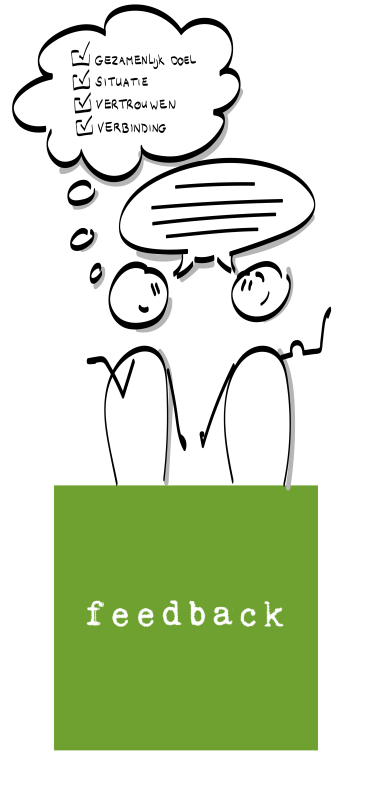Is this feedback?
Is this feedback? But then how do I give feedback? These are perhaps the questions we hear most often in our work. Learning from each other is best done with feedback, it is the highway to a top team. But it doesn't turn out to be easy in practice, it's not for nothing that we very often get asked for a training course on 'giving feedback'. And there is also, unfortunately, no simple answer to the question: 'So how can I give feedback well?' However, if we look at the Cooperation Scale, there are some handles that can be helpful.
To start, let's clarify the distinction between criticism and feedback as we use it on the Scale. We do not do positive and negative feedback or criticism but have chosen to give both words their own place and meaning.
Criticism
We call something criticism when it is one-way: I tell you what you did wrong and you have to put up with it. There is little or no interaction, it does not focus on solutions, it focuses on a problem, and it is not my problem but yours. Sometimes blame also plays a role in this and criticism is the means to blame the other person. Whether something is perceived as criticism or feedback, both the sender and the receiver have an influence on that. But ultimately, the receiver's reaction is decisive. After all: the receiver has to do something with it. If the receiver dives, becomes stressed, enters into a discussion or starts a counterattack, there is no learning effect and you cannot speak of (successful) feedback.
Feedback
We call something feedback when it is two-way. Something happened, I think something about that, but I want to solve it with you. A problem may be the trigger, but the solution is central to the feedback. And as a sender, I am equally open to receiving and looking at my part in the 'problem'. Something also becomes feedback when you make agreements you are going to come back to: 'From now on, we are going to do this and that and in a fortnight we will see if that makes it better.'
Making feedback successful
There are a number of prerequisites necessary to make feedback successful:
- Having a common goal is very helpful (if not necessary). Then you both know what you are doing it for and how the feedback can contribute to it. A special feature of a goal is that you are not there yet. Something is still in the way or there is not yet a priority. In short, there is a challenge and feedback can help you move forward.
- There has to be a feedback-worthy situation. A trigger that makes it possible (and necessary) to give feedback. For example, behaviour of a person that you think does not contribute to the achievement of the common goal; a choice someone has made or a task that has not been done well (enough).
- There needs to be sufficient mutual trust and connection for the feedback to be given. The more the feedback is about behaviour rather than a task, the more trust is needed. And building trust takes time. It takes appreciation and regular confirmation that you can trust each other. Connection is also a prerequisite for being able to build on your relationship with the other person from the feedback. Giving and receiving feedback is almost always exciting and knowing that you appreciate each other helps enormously to continue working together on good terms afterwards.
Check: is this feedback?
- Check 1. Feedback connects to a common goal.
To what shared goal does my feedback connect? If there is no common goal, feedback will soon be perceived as critical or discussion will arise, resulting in a loss of learning. - Check 2. Feedback provides insight.
You breathe a sigh of relief: okay, I hadn't thought of this. Or: I hadn't realised you were experiencing it this way. - Check 3. Feedback gives connection.
I am not alone, my colleague is helping me. We are together now. - Check 4. We will come back to it.
By coming back to it, we secure improvement that comes from the feedback. - Check 5. Feedback energises.
Yes, it could have been better. And yes, it took energy to the threshold about it and giving/receiving feedback. But it gives a sense of 'together you get further' and that DOES energise!
There are obviously dozens, if not hundreds, of models on feedback. Roadmaps that may or may not be tailored to the other person's communication preference and should lead to effective feedback. However, if the above conditions are not met, then no sandwich method can help you turn criticism into feedback.
Feedback is about being honest from connection.... Cooperation!

